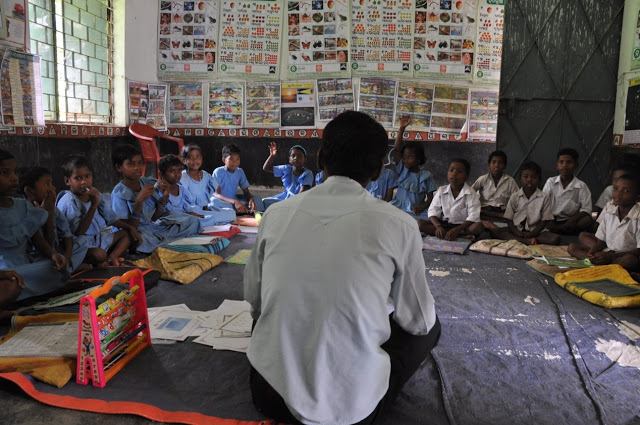EDUCATION
Teaching as a vocation requires us to grow and learn throughout. Children can benefit from a pedagogue when she is introspective and eager for her vocation.
Shehnaz currently working with Bachpan Banao NGO in Dantewada district of Chhattisgarh.
Teaching is often considered as one of the easiest jobs but in practice it is one of the most challenging ones. As a teacher you don’t deal with only the academic aspect of child’s learning but you have to engage with the child as a whole entity. You have to take care of social, psychological and emotional aspects of the child.

Also it is a job which is continuously going through tremendous changes. Different approaches of teaching- learning are being introduced. In such a time it becomes even more challenging for a teacher to keep herself updated. Nowadays even terminology being used for a teacher has changed. National Curriculum Framework which was introduced in 2005 uses the word ‘facilitator’ for the teacher which means a teacher’s role is more about scaffolding the knowledge as it is not something which can be given to a child. Now it is expected that teachers and students mutually will create a space where knowledge can be built. Imagine in such a changing context how challenging it could be for a teacher to keep herself updated about upcoming changes, grow professionally and take care of different educational needs of children.
I am working as a teacher educator since more than two years in Dantewada district of Chhattisgarh. I also take classes of students. While taking these classes I keep introspecting on the various pedagogical challenges I face and how these could be overcome. The kind of challenges I face while working in a government school setting which is an already established structure are more or less common throughout the different places. The only difference is that the number of students I deal with in a class is very less in comparison to other states where you will find Forty to Fifty students in a class.
NCF 2005 also says that each child should be given opportunity of learning on their own pace. This is very much true as in a class of twenty students you will find that each child has their own speed of learning. When I take classes I find that some students quickly pick while others take time. So sometimes what dilemma I face is that if I will hold on the class and wait for other students to reach that particular level of understanding then am I not compromising with the learning of those students who are fast learners?
One way of dealing with this problem which is quite famous is to take remedial classes of students but in the context where I am working that also couldn’t be applied. Here a child comes to school at 10am and stays in the school till 4pm. Before coming to school they have various responsibilities like collecting timber, seasonal fruits and bringing water for the family’s use. So if I call them early in the morning then it will be a hindrance in fulfillment of their responsibilities. And if I use another way and make them stay after school hours then it’s again difficult as most of the students come from places very far from their schools and it would be difficult for them to manage.
After continuous discussion and thought process my interaction with one of my friends helped me a lot. He is also a teacher educator so most of our challenges are quite similar. When I shared the above concern he simply said that those who are fast learners will eventually learn even if the teacher’s intervention will be minimal. What is important is to make those children learn at least basics and reach the average level of competency required for them to achieve at that grade level. In addition to this one of my professors also told us that in western countries more focus is given to those children who are lagging behind but in our country we do the reverse. When I think what could be the reason of this I feel it’s more convenient to work with fast learners leaving slow learners behind.
Now coming to the next challenge, we all know that each child learns differently. Now that traditional chalk and talk method doesn’t works. In a class of twenty students you will find that some will learn and catch things just by listening about it while others will need a visual to gain a better understanding. Selecting an appropriate visual is also a time taking task for the teacher. Apart from this a teacher will also have to understand that it’s not just that you play the visual and let the child understand, you have to pause the video and discuss in more detail the things presented in that especially if you are dealing with students of higher grade level. Some will engage with a text in a better way when they are given opportunity of self learning while others will need teacher’s help at each and every step to clarify things.
So first you have to identify which method works for which student then another challenge would be to incorporate these different methods in your teaching methods. If you will resolve this one and you start using different methods then the normal school setting will not allow you to do much intervention. While taking classes sometimes I feel the need of organizing students in groups. At that time it becomes difficult for me to do so since the classrooms are already occupied with tables and chairs.
Apart from these if you are a sensible teacher and don’t want to impose anything on children and want them to decide what they want to learn, then?? Let me tell you my own experience. Sometimes when I enter in the classroom and ask students what they would like to learn I get four different kinds of responses. Some say they are interested in Maths and others say they want to study a different subject. So it becomes difficult for me to handle multiple subjects at one time. Classroom setting also doesn’t allows me do let them sit and study in groups the choice of subject they want to study.
Apart from the above challenges it is equally important to notice that these challenges will come in the way of a teacher who is content wise strong. I mean a teacher who has good content knowledge can still face these issues but in case of an area like Chhattisgarh where teachers lack content knowledge itself all these things become secondary. In this area one has to start working from scratch as majority of teachers lack basic subject knowledge.
ALSO READ:
A Creative Outlook at the Issue of Remaining Absent from the Classroom in Schools
So while presenting all the pedagogical issues I would like to clarify that it’s true that a normal government school setting doesn’t allows to do much intervention but all this could be resolved if a teacher takes initiative to resolve them, like if a teacher arranges the classroom in a way so that children can sit in groups and sit on the desk as per the requirement.
In my case I am not a teacher, I am dependent on teachers for leading change. I can convince them to make these positive changes in school setting but after all they only will do things. And for making these changes whether in their teaching strategy or in overall setting of school, they must be confident enough to be assertive to convince their superiors for justifying why they are doing something in a particular way. So at the end I will say that challenges do exist but once someone makes their mind to overcome those challenges then it’s not impossible to overcome them. Also a teacher has to be open to learn new things and grow professionally.
***










